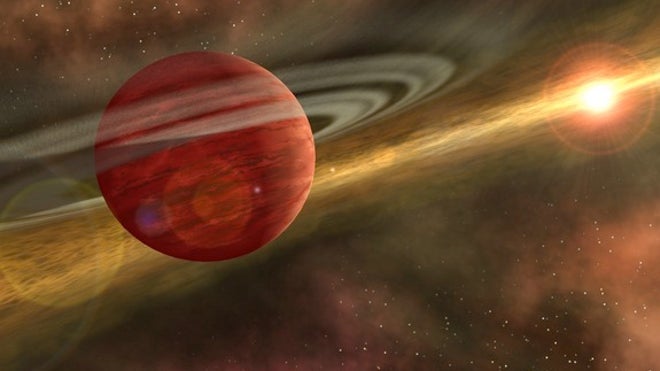
An artist's conception of a young planet in a distant orbit around its host star. The star still harbors a debris disk, remnant material from star and planet formation, interior to the planet's orbit. (NASA/JPL-CALTECH)
Posted on 12/06/2013 8:16:03 PM PST by NYer
An enormous alien planet — one that is 11 times more massive than Jupiter — was discovered in the most distant orbit yet found around a single parent star.
The newfound exoplanet, dubbed HD 106906 b, dwarfs any planetary body in the solar system, and circles its star at a distance that is 650 times the average distance between the Earth and the sun. The existence of such a massive and distantly orbiting planet raises new questions about how these bizarre worlds are formed, the researchers said.
"This system is especially fascinating because no model of either planet or star formation fully explains what we see," study lead researcher Vanessa Bailey, a fifth-year graduate student in the University of Arizona's department of astronomy, said in a statement. [The Strangest Alien Planets (Gallery)]
In the most commonly accepted theories of planet formation, it is thought that planets that orbit close to their parent star, such as Earth, began as small, asteroid-type bodies that clumped together in the primordial disk of gas and dust around the burgeoning star. Yet, this process operates too slowly to explain how giant planets form far away from their star, the researcher said.
'The planet is only 13 million years old, and is still glowing from the heat of its formation.'
- Researchers with the University of Arizona's department of astronomy
Alternative hypotheses have suggested that distant giant planets may form in ways similar to mini binary star systems, Bailey said.
(Excerpt) Read more at foxnews.com ...

Way cool, ping!
For those who are intrigued by the universe.
God made cool stuff.
You tell it to its face that it is moving in a bizarre orbit!
It can go anywhere it wants.
Why didn’t this thing ignite into a star?
An alien planet?
A planet bigger then our Jupiter ... I’m jealous.
Maybe it was a star. After all, we really have no idea how planets form. Just guesses.
I bet gravity sucks big time on that planet.
Thank you for posting this.
It might still be growing, it may ignite yet.
I’m a hermit, beyond that I have few requirements, mostly involving a hydrogen/oxygen/temperature mix...Call me, I’m interested.
Cool indeed..
I wonder though why something unexpected is often seen as strange, alien whatever...
We are developing the technology to get out of the box of the night shy, but are we collectively smart enough to do so....
>> Why didn’t this thing ignite into a star?
How do you know it didn’t?
 |
||
| · join · view topics · view or post blog · bookmark · post new topic · subscribe · | ||
| Google news searches: exoplanet · exosolar · extrasolar · | ||
“Why didn’t this thing ignite into a star?”
Insufficient mass. It may ultimately fall into the category of a brown dwarf star versus a super-Jovian class planet.
Every star we can see has planets and moons in rotation of their own solar systems. Deep space Hubble shows us innumerable galaxies of stars.
When I get overwhelmed by what links to real news that FR provides, I try to buffer my sanity by accepting that the entire human race really has no clue about the universe.
We have allowed ourselves to be consumed by Muslims, Gays, Communists, and Political Correctness, when we should have been already working on space shipyards.
You wouldn't be able to lift a finger...or to breathe, even if there was a breathable atmosphere.
If it had there would have been a binary star with no particular interest to anyone..
Not big enough to be star in nature need a critical gravitational mass to compress the nucleus..
It was the realization by the physicists around 1940 that this critical mass could be artificially created with enriched Uranium that lead to Hiroshima and winning the war..
Disclaimer: Opinions posted on Free Republic are those of the individual posters and do not necessarily represent the opinion of Free Republic or its management. All materials posted herein are protected by copyright law and the exemption for fair use of copyrighted works.